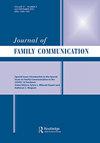Contexts for Family Talk about Racism: Historical, Dyadic, and Geographic
IF 1.8
Q2 COMMUNICATION
引用次数: 7
Abstract
ABSTRACT Scholars studying ethnic-racial socialization often call for research with larger and more representative samples to permit comparison of the behaviors of members of various ethnic-racial subgroups. Moreover, research has highlighted the value of examining contextual variables that may influence ethnic-racial socialization behaviors. With a backdrop of the racially charged 2016 United States (U.S.) presidential election campaign, national survey data from White, Black, and Hispanic parents of children ages 6 to 17 were merged with geographic race data. Findings reveal that characteristics of parents (including partisanship) and children (especially age), as well as dyadic characteristics of the parent–child (e.g., general talk frequency and campaign-related talk) and of the geographic context (i.e., county racial composition) affect the frequency of parent–child racism talk. Many predictors vary in their importance by parent ethnicity-race. For instance, White parents talk about racism less, and Black parents more, when Whites numerically dominate the county in which they reside.家庭谈论种族主义的背景:历史、Dyadic和地理
研究种族社会化的学者们经常呼吁用更大、更具代表性的样本进行研究,以比较不同种族亚群成员的行为。此外,研究强调了考察可能影响种族社会化行为的情境变量的价值。在2016年美国总统竞选充满种族歧视的背景下,来自6至17岁儿童的白人、黑人和西班牙裔父母的全国调查数据与地理种族数据合并。研究结果表明,父母(包括党派)和孩子(尤其是年龄)的特征,以及父母-孩子的二元特征(如一般谈话频率和竞选相关谈话)和地理背景(如县种族构成)影响父母-孩子种族主义谈话的频率。许多预测因素的重要性因父母种族而异。例如,当白人在他们居住的县占主导地位时,白人父母较少谈论种族主义,而黑人父母则较多。
本文章由计算机程序翻译,如有差异,请以英文原文为准。
求助全文
约1分钟内获得全文
求助全文

 求助内容:
求助内容: 应助结果提醒方式:
应助结果提醒方式:


